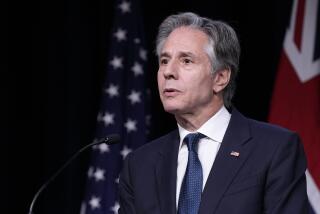U.S. Ties Its Afghan Rebel Aid to Soviet Help
- Share via
WASHINGTON — The Reagan Administration, hardening its conditions for an Afghanistan peace settlement, vowed Friday to continue military aid to anti-government rebels until the Soviet Union ends its support of the Afghan army.
State Department spokesman Charles Redman confirmed a Soviet complaint that Washington no longer is willing to end its support for the rebels, known as moujahedeen, as soon as Moscow sends home enough of its estimated 115,000 troops to make the withdrawal process irreversible.
Moscow maintains that the American position creates a new obstacle to the removal of the Soviet forces. Soviet officials insist on their right to continue government-to-government aid programs after the end of other forms of outside assistance to factions in the country’s civil war.
“The Soviets can’t claim a right to aid a faction in the Afghan civil strife just because that particular faction tries to call itself the government of Afghanistan,” Redman said. “That so-called government is one faction, and nothing more than that.”
Redman also seemed to withdraw a longstanding U.S. pledge to act jointly with the Soviet Union to guarantee Afghan peace if current U.N.-mediated talks in Geneva produce an agreement.
“If an agreement is reached, we will closely examine the text before making a decision whether or not to act as a guarantor,” he said.
The newly public dispute seemed to be creating a confrontation between Washington and Moscow. Unless one side backs down, it is difficult to see how an agreement can be reached for the removal of Soviet forces.
Redman’s hard-line comments came in apparent response to complaints by conservative supporters of the moujahedeen that the Administration was preparing to sell out the rebels. For instance, Sen. Gordon J. Humphrey (R-N.H.) complained recently that the flow of military supplies to the moujahedeen already has been cut sharply in anticipation of an agreement on the withdrawal of Soviet forces.
Soviet leader Mikhail S. Gorbachev said last month that Moscow would begin to pull its forces from Afghanistan on May 15 if the Geneva talks produce an agreement by next Tuesday on the conditions for a withdrawal.
It now seems impossible that the indirect negotiations between Pakistan, which has been serving as a base for much of the rebel movement, and the Afghan government could produce results that soon. However, provisions already agreed to require an end to foreign intervention in the Afghan civil war.
“The United States and Pakistan are called upon (by the draft agreement) to cease military aid,” Redman said. “It’s only logical that nonintervention and non-interference provisions should apply to the Soviets, too.”
However, Nikolai Kozyrev, chief of the Soviet observer team at the Geneva talks, told a press conference Thursday that Moscow’s support for the Afghan army is “a question of bilateral relations between two governments and it should not bother anybody.”
Redman said that the Soviets have been aware for at least several weeks that the United States would not end its support for the rebels until Moscow ends its backing for the government.
Asked if he was charging that the government of President Najibullah is illegitimate, Redman responded, “Very perceptive.”
“Even with the presence of . . . Soviet troops, the present Kabul regime has barely been able to secure the capital and a few other cities,” Redman said.
More to Read
Sign up for Essential California
The most important California stories and recommendations in your inbox every morning.
You may occasionally receive promotional content from the Los Angeles Times.













